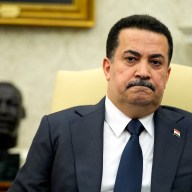ISLAMABAD – Pakistan’s wresting control of key areas from the Taliban has given enough “breathing room” to allow U.S.-Pakistan relations to shift focus to energy and economic development, although security remains a vital concern, Washington’s special envoy to the region said Sunday.
Pakistan suffers from a chronic shortage of energy and millions suffer prolonged power cuts every day because demand for electricity far outstrips supply. The unstable power supply has damaged local industry, with factories unable to keep up production levels and small businesses struggling to cope, and has sometimes triggered riots.
“We shifted the focus deliberately and consciously today to the issue that every Pakistani tells me is on their minds more than any other – (the) economy and above all energy,” Richard Holbrooke said after meeting with Foreign Minister Shah Mahmood Qureshi. “We are concerned with more than just the western tribal areas – although those remain a central concern.”
Holbrooke, who is expected to visit Pakistan’s commercial capital of Karachi in coming days, gave no details but said projects would be announced later.
Washington had long wanted Islamabad to crack down on militants with strongholds along the western border with Afghanistan, a rugged and lawless tribal region where the Pakistani Taliban are believed to be sheltering al-Qaida leaders and helping to plan attacks on U.S. troops across the border.
The military has been winding down an offensive against the Taliban that began in late April around the northern Swat Valley and led to some 2 million people being displaced. The offensive marked a turn in Pakistan’s anti-terrorism fight in part because a Taliban takeover of the alpine enclave – which once boasted Pakistan’s only ski resort – had become a symbol of the extremists’ expansion.
The displaced have been returning home and the area has been largely secured, although the military says it still faces pockets of Taliban resistance.
As if to underline this issue, a suicide bomber blew himself up when security forces encircled him during a search operation in Swat’s main town of Mingora on Sunday night, lightly wounding four soldiers, the army said. Another seven militants were killed during the search, the military said in a statement.
It was the second suicide blast in two days in Swat; an explosion killed five and wounded several more in the town of Khawaza Khela on Saturday.
The military said it would impose an all-day curfew in Mingora Monday, when Holbrooke planned to travel there.
Holbrooke said that despite recent successes, there were still problems.
“Now there’s much more breathing room. But I stress … we all know the underlying problems are still to be dealt with,” Holbrooke said.
He said both countries would continue “to be concerned with all the issues we’ve talked about in the past, because although considerable progress has been made in every area since I first came here in an official capacity, the underlying issues still remain.”
Qureshi said the Swat offensive had taken out the second and third tier Taliban leadership, and vowed to pursue the remaining militants.
“We’ve also got the top leadership on the run. Getting Baitullah Mehsud is an achievement, is a victory, a step forward,” he said. “I would not rule out the fact that some could have dispersed. But we will chase them, and we will go for them wherever they are.”
There have been conflicting claims as to Mehsud’s fate, with some Taliban commanders insisting he is alive but providing no concrete proof to back up their assertions.
Washington has reportedly been anxious for Pakistan to capitalize on the momentum by launching a ground offensive in the Taliban-controlled tribal areas west of Swat – including Mehsud’s stronghold of Waziristan. However, Holbrooke said the timing was up to the Pakistani military, which has been launching aerial assaults against militant bases near the border.
“That is a decision for the Pakistan government to make and to make alone,” he said. “We’re not going to come here to give tactical advice to the Pakistan army. They can take care of their problems themselves.”
Since Mehsud’s presumed death, several clashes among militants have been reported, with Pakistani officials saying they were evidence of a brutal succession struggle among commanders to replace the Taliban leader.
On Sunday, two intelligence officials and a militant said 17 fighters loyal to a faction commander, Maulvi Nazir, were killed in an ambush in South Waziristan. The intelligence officials spoke on condition of anonymity because they were not allowed to speak to the media.
It was not immediately clear whether the attackers were fighters from Mehsud’s faction or Uzbeks living in the area after they were flushed out of the nearby Wana area by Nazir’s fighters a few years ago.
Shaheen Wazir, a commander of the Nazir faction, told the AP that the 17 fighters had been ambushed inside a Mehsud area.
Pakistani Taliban spokesman Azam Tariq confirmed the incident but insisted there were no differences between the Mehsud and Wazir groups, and said the incident could be a conspiracy to create a split in the Taliban.
Tariq said jets bombed another area of South Waziristan on Saturday, Makeen Bazaar, killing more than a dozen tribesmen and wounding 16 others, including children.
“We promise to take revenge the killing of innocent tribesmen,” he said.
There was no way to verify any of the casualty accounts as journalists are barred from the tribal areas.
–
Associated Press writer Ishtiaq Mahsud in Dera Ismail Khan contributed to this report.
















